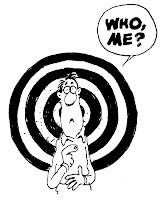5-1/2 Questions to Ask Before Producing a Video: The Pagano Video Method - Part Two
Who are You?
 |
| Question 1 in the Pagano Video Method: Who are you? |
Although I'm concentrating
on corporate videos in this article, the five-and-a-half questions of the Pagano Video Method can be applied just as effectively to your home videos about vacations, birthdays,
and even your kids' college application videos.
The five big questions are always the same.
Question 1: Who are You? (Part One)
We kick off our five-and-a-half
questions with what I think is the most important question of all. It's so important that we ask it twice: Who are you?
Though this question may seem simple, and you might
think you already know the answer, don't be so sure. Take the time to answer it and its sub-questions completely.
You'll gain valuable insight. Here's why:
When actors prepare for a
new role, they often create a backstory for their characters. Although the script might describe the
character Julie as "a confident, pretty,
single woman in her 20s who is trying to make a living as an artist," actors
know this description isn't detailed enough.
They compensate for the lack of detail by creating their own story about
the character they portray. This backstory could go back as far as the character's childhood and may describe where they grew
up, their family, personal style, and even key incidents in their lives:
Julie
is a 20-year old brunette. Most people
would consider her pretty, but she wasn't always so. She grew up with a hooked nose, a rather
large one at that, and it always made her self-conscious. She was a plastic surgery success story,
because following the operation she had two years ago, she began to like
herself more, others found her more attractive, and the dreaded "Mama Hooknose"
taunts she had endured through childhood ceased ...
Wow! That's a lot of information we didn't have
before. Now we know that Julie's
confidence is due to an action she took two years ago -- getting plastic
surgery. We also know that before the surgery her peers teased and taunted her for her funny nose. They even called her "Mama
Hooknose." None of this is in the
script, but it will come out in the actor's portrayal of the character.
The back story gives
actors knowledge they need to make the characters come to life. It's a window into why the character thinks
and acts a certain way and what its little foibles and personality quirks might
be. Though Julie is a confident young
woman, something inside might still bristle whenever someone tells her that she
has an excellent sense of smell.
And so it is with
video. To make a great video, whatever
the subject matter or purpose is, we need an answer the question "who
are you?" We need your back story.
So, who are you?
To answer that question,
we ask more questions:
- What business are you in?
- How long have you been at it?
- What's your primary service or product?
- Who uses it?
- What other products or services do you offer?
- How did you get involved in this business?
- Who are your competitors? The biggest? The up-and-comers? The one who most makes you nervous?
- What successes have you had?
- What have you done that hasn't been so successful?
- What problems are there?
- What opportunities exist?
- What do you value? Customer service? Profits? Providing a service or product that improves people's lives? Something else?
- What is your mission?
- And finally, can you describe your company in fifty words or less?
You can probably think of
many more questions to ask yourself that will drive you to answer the big
question, "Who are you?" Ask
them!
When you're done, you'll have
your backstory. Though it may not overtly
come into play in the video that introduces your new widget, the knowledge of
who you are will be there, lurking in the background and influencing a myriad of factors
that go into a successful video -- specific word choices in the script, camera
angles, background music, even whether you are best served by
animation or live action.
That's the first question in the Pagano Video Method. It's not limited to just corporate videos,
either. You can apply my method to
videos about your wedding, family vacation, Aunt Edna's 70th birthday party,
or anything else.
Learn your back
story. Ask the big question, "Who
are You?"
Come back next week for a
discussion of the next question in the Pagano Video Method, "What do you do?"
Thanks for reading!
Fred Pagano
---
Don't want to wait for the
next article in this series? Get it from
the horse's mouth: Learn more about the Pagano Video Method and how it can help
you produce great videos direct from the source. Contact Fred Pagano at Brown Cow Studios today!
---
Copyright 2013 Fred Pagano
& Brown Cow Studios of Boston. All rights reserved. This copyrighted article may be redistributed
provided all text, credits, and this copyright notice are intact. Please let us know you've linked to us.
---

